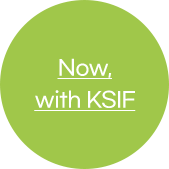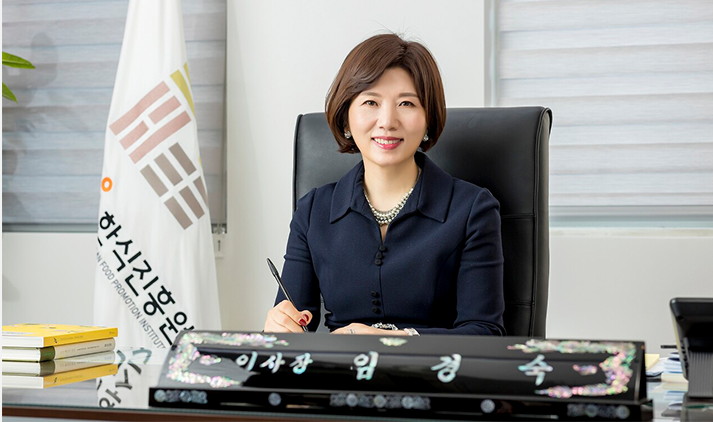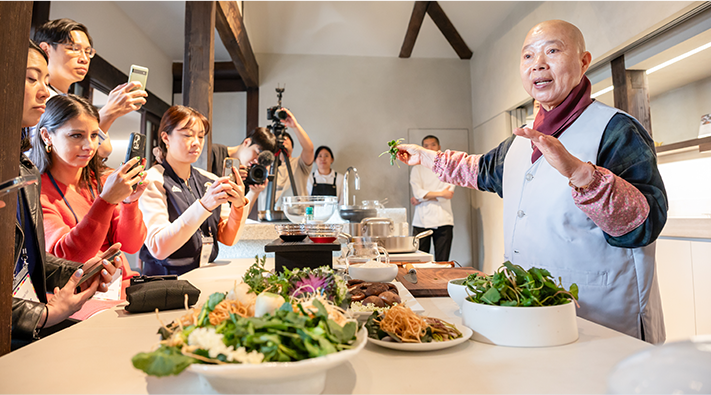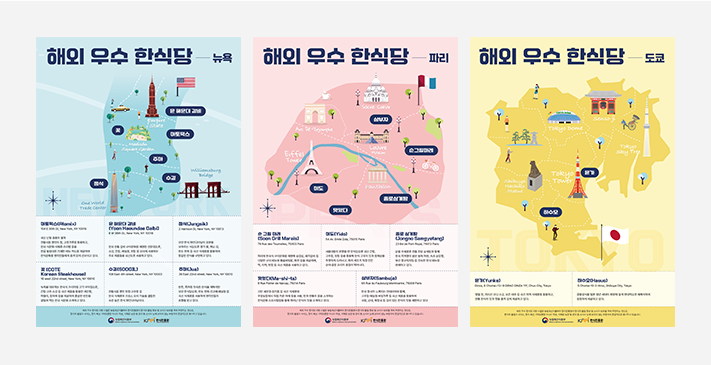

“Enhancing the Status and Competitiveness
of Korean Cuisine Globally”
Yim Kyeong-sook, Chairman of the
Korean Food Promotion Institute
Since 2017, the Korean Food Promotion Institute has collaborated with the KSIF to dispatch Korean cuisine
experts to conduct Korean cuisine classes as part of the Sejong Cultural Academy. Every year, they provide
high-quality Korean cuisine classes to KSI learners, nurturing future Korean cuisine professionals and leading
the research, development, and globalization of Korean cuisine. We met with Chairman Yim Kyeong-sook to discuss
these efforts.
Chairman Yim Kyeong-sook, hello! Thank you for agreeing to this interview. Before becoming the Chairman of the
Korean Food Promotion Institute, you were active as an expert in various fields of Korean cuisine. Please
introduce yourself to the global KSI community who greatly enjoy Korean food.
Hello, I am Yim Kyeong-sook, the 6th Chairman of the Korean Food Promotion Institute. I majored in Food and
Nutrition and served as a professor of Food and Nutrition at Suwon University for a long time before becoming
the Chairman of the Korean Food Promotion Institute in August 2021. Nice to meet you.
The Korean Food Promotion Institute is a specialized public institution that leads the future value of Korean
cuisine. Could you introduce the projects that the institute is implementing for the development of the Korean
cuisine industry? Among them, is there any particular project you have been focusing on since your
inauguration?
The Korean Food Promotion Institute collaborated with the Ministry of Agriculture, Food, and Rural Affairs and
the Seoul Metropolitan Government in March of this year to bring the international gourmet event 'Asia's 50 Best
Restaurants' to Seoul for the first time in Korea. Hosting 'Asia's 50 Best Restaurants' was significant as it
helped spread Korean cuisine culture domestically and internationally and served as a cornerstone for Korean
cuisine to lead global gourmet trends. At this event, the institute conducted three Korean cuisine workshops,
which helped build a positive image of Korean cuisine among domestic and international gourmet professionals and
media, and provided an in-depth exploration of traditional Korean cuisine.
In October last year, we invited domestic and international gourmet professionals, chefs, and media to hold the
'HANSIK Conference 2023'. The conference discussed 'Directions for the Development of Korean Cuisine, Global
Branding, and Training of Korean Cuisine Talents' and shared insights on the future direction of Korean cuisine.
In the second half of this year, the institute plans to hold another Korean cuisine conference to discuss the
global development strategies of Korean cuisine with domestic and international experts.
(Left Photo) The 'HANSIK Conference 2023' hosted by the Korean Food Promotion Institute and the Ministry of
Agriculture, Food, and Rural Affairs
(Right Photo) Yim Kyeong-sook, Chairman of the Korean Food Promotion Institute, delivering a welcome address at
the 'HANSIK Conference 2023'
The KSIF operates the 'Sejong Cultural Academy' project, dispatching Korean culture experts to overseas KSIs.
Since 2017, the Korean Food Promotion Institute has been sending Korean cuisine experts to KSIs in
collaboration with the KSIF, providing high-quality Korean cuisine classes to learners. These classes have
been well received as they offer learners the opportunity to cook and taste Korean cuisine that they had only
seen in photos and videos. Conversely, how do the Korean cuisine experts participating in the Sejong Cultural
Academy feel about the classes at KSI?
The learners we meet at KSIs around the world look at Korean cuisine with interest during the classes and
continue to show interest in Korean cuisine even after the classes are over. The experts involved in the project
feel a sense of pride and honor through the Sejong Cultural Academy classes. They also experience the joy of
growing together with the learners, from different cultural backgrounds, by sharing cultures and creating a
sense of community through Korean cuisine.
Additionally, the Korean Food Promotion Institute actively conducts domestic Korean cuisine education
projects, such as providing Korean cuisine education to participants of the 'World Korean Educator Conference'
and 'Korean Cultural Experience Program for KSI Learners' hosted by the KSIF. Could you introduce any ongoing
Korean cuisine education projects in Korea this year?
The Korean Food Promotion Institute consistently conducts Korean cuisine education and manpower training
projects, including job and startup mentoring. This year, to nurture competent young Korean cuisine chefs, we
will start a project to support internship training costs for companies and Korean restaurants that run
internship programs. We also plan to support educational program operation costs for higher education
institutions that nurture young Korean cuisine chefs through the 'Support for Training Institutions of Korean
Cuisine Experts' project that we implement annually.
Furthermore, to promote Korean cuisine-related startups among young people, we will form a Korean cuisine
startup mentoring team to provide necessary education for startups, from space design to branding and marketing,
to discovering and nurturing Korean cuisine professionals.
(Left Photo) 'Korean Cuisine Learning Center' inside the Korean Food Promotion Institute's
Korean Cuisine Cultural Space 'E:eum'
(Right Photo) Various cultural events and performances related to Korean cuisine held at
'E:eum & Korean Cuisine Library'
The Korean Food Promotion Institute expanded the previously operated Korean Cuisine Culture Hall and opened
the Korean Cuisine Cultural Space 'E:eum' in March 2022. In addition to Korean cuisine experience events, we
provide a variety of Korean food cultural content, including exhibitions and Korean food book rentals.
Adapting to Korean food is also a big topic among KSI students studying in Korea. What kind of content can KSI
students enjoy when they visit 'E:eum'?
The Korean Cuisine Cultural Space 'E:eum' offers various Korean food programs that foreign visitors can
participate in. There are Korean cooking classes where you can learn and cook seasonal snacks or representative
dishes for each season using seasonal ingredients. These cooking classes at 'E:eum' are also available online
for convenient access.
'E:eum' also hosts monthly Korean food book concerts, inviting notable figures to discuss various topics and
share stories related to Korean food. If you want to learn more about Korean cuisine, you can participate in the
'Korean Food Research Academic Seminar,' which explores specialized topics in depth. Last month, the first
Korean Food Research Academic Seminar of 2024 focused on 'traditional liquor,' discussing its present and future
and providing a tasting session.
The Korean Food Gallery on the first floor regularly holds exhibitions on various themes, including Korean food,
traditional food culture, and tableware, offering plenty to see. The Korean Food Library houses about 2,500
food-related books, including foreign books, and is freely accessible to anyone.
 Monk Jeong Kwan demonstrating temple cuisine at the 'Korean Vegan and Temple Food' workshop
Monk Jeong Kwan demonstrating temple cuisine at the 'Korean Vegan and Temple Food' workshop
Recently, 'ssamjang' was ranked 19th on the list of 'The Best Dipping Sauces in the World.' The global gourmet
media introduced 'ssamjang' as a Korean dipping sauce made by combining gochujang and
doenjang, highlighting the world's interest in Korean cuisine once again. Could you introduce a Korean dish
that people worldwide should pay attention to or experience in the future?
With increasing global interest in health and well-being, more people are naturally seeking healthy foods. Among
them, vegan food, which uses fresh vegetables and is relatively low in calories, is attracting attention.
In line with this trend, Korea's 'namul'(seasoned vegetables) is an excellent choice. Namul is not only high in
dietary fiber and other nutrients, as it uses seasonal ingredients, but it is also seasoned with our traditional
sauces, making it an ideal food to introduce healthy Korean ingredients and traditional sauces to foreigners.
Nowadays, when 'healthy food' is in the spotlight, I recommend namul as a Korean dish that foreigners will
enjoy. I believe it will captivate the taste buds of people worldwide.
 Posters of excellent Korean restaurants overseas (from left) New York, Paris, Tokyo
Posters of excellent Korean restaurants overseas (from left) New York, Paris, Tokyo
Finally, could you share the Korean Food Promotion Institute's operation and development plans for the
continuous globalization of Korean cuisine?
To strengthen the position of Korean cuisine on the world stage, the Korean Food Promotion Institute is
promoting projects such as the 'Overseas Excellent Korean Restaurant Designation System' and the 'Overseas
Korean Restaurant Council' to enhance the quality of overseas Korean restaurants.
The 'Overseas Excellent Korean Restaurant Designation System' involves designating excellent Korean restaurants
abroad through expert evaluations and supporting the purchase costs of domestic ingredients and tableware. So
far, a total of 13 restaurants in New York, Paris, and Tokyo have been selected as excellent Korean restaurants.
This year, we expanded the designated cities to London and accepted applications from Korean restaurants, with
plans to announce the newly selected excellent Korean restaurants at the end of the year.
The 'Overseas Korean Restaurant Council' organizes about 2,000 Korean restaurants in 26 regions of 15 countries
into councils by city, providing support in various ways, including business consulting, joint purchasing of
domestic ingredients, and menu consulting. Through this, we aim to improve the quality of overseas Korean
restaurants and spread a positive perception of Korean cuisine.
The Korean Food Promotion Institute will continue to create opportunities for culinary professionals and media
to interact through Korean cuisine both domestically and internationally. Through various events and programs,
from the Korean Cuisine Conference to the E:eum program and various Korean food research academic seminars, we
will strive to develop Korean cuisine culture and enable people around the world to enjoy it.